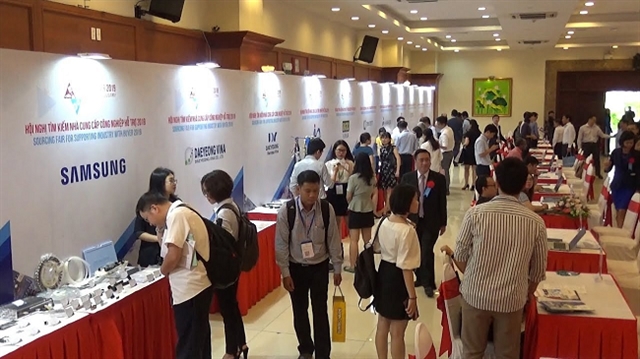More and more Vietnamese enterprises have become suppliers of supporting products to overseas markets such as the US, Republic of Korea, Japan and Europe.

More and more Vietnamese enterprises have become suppliers of supporting products to overseas markets such as the US, Republic of Korea, Japan and Europe.
Representatives of local firms said at a recent conference on the supporting industry held in HCM City that their companies had joined global supply chains and were seeking opportunities to expand their overseas markets.
The conference was held to provide opportunities for local and foreign firms to look for manufacturers of components for products in the fields of electronics, automation, motorbikes, automobiles, and health care.
Nguyen Kim Chai from Hanel Viet Nam said his company had supplied products to the Japanese market for more than 20 years. The products include components and spare parts for electrical transformers, household electronic equipment, automobiles and telephones.
To act as a supplier for its Japanese counterpart, the company has not only ensured quality but also changed technologies.
To cut production costs and make its products more competitive, it has improved automated capacity management for its production lines and lowered the ratio of scrapped products, according to Chai.
Meanwhile, other local suppliers said that Vietnamese firms supplying products to Japan were capable of meeting the demand of global supply chain.
Numerous free trade agreements signed between Viet Nam and other countries have helped promote Vietnamese exports and expand overseas markets for Vietnamese goods, they said.
These free trade agreements have also helped foreign-invested firms manufacture end-products in the country.
According to Nguyen Phuong Dong, deputy director of HCM City Department of Industry and Trade, the percentage of products supplied by local firms to the local market since 2017 has risen by 10 per cent to 30 per cent. Products supplied by local enterprises have also changed, from simple to high value-added products.
Dong said the country's potential to was huge, and that the Ministry of Industry and Trade and HCM City authorities had helped local enterprises by removing technical barriers related to capital, investment, production lines and high-level human resources.
Manufacturers in the supporting industry in HCM City are eligible to receive preferential loans (zero per cent interest rate) for seven years to invest in building factories, with loans amounting to VND200 billion (about US$8.65 million) for each project, he said.
Since 2018, over 30 enterprises have applied for these preferential loans, and nine of them have been eligible for loans of more than VND943 billion, he said.
More than 300 supporting-product companies and foreign-invested companies specialising in manufacturing end-products attended the conference held by the HCM City Department of Industry and Trade on September 11.
Of the attendees, there were 100 enterprises specialising in supporting products from HCM City and other localities across the country.
The conference also saw the participation of 25 foreign-invested enterprises that manufacture end-products, up by 40 per cent compared with last year.
These include Samsung, Daeyong Harness, GST Viet Nam, Backer, Heating, Minamida Viet Nam, Hanel PT, Bosch, Nipro, Panasonic, and Datalogic Viet Nam.
According to the organisers, the firms, which specialised in end products for the electronics, automobile and mechanics industries, connected with about 80 local supporting enterprises, and held 242 meetings with partners during the event.
After the conference, 92 per cent of end-product manufacturers were considered potential customers, while 36.4 per cent of buyers asked suppliers to send them price lists.
In addition, 47.5 per cent of buyers proposed visits to suppliers’ manufacturers, while 85 per cent of them agreed to have further meetings after the conference.—VNS





